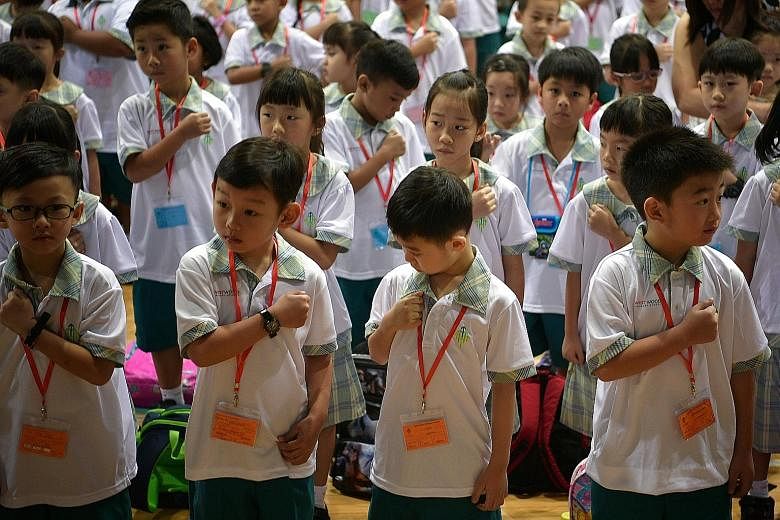China has ordered schools to scrap written homework for Primary 1 and 2 pupils and also keep homework to an hour for older pupils in primary schools.
Its latest move to reduce the academic workload of schoolchildren comes as Chinese society is divided over whether the children should be given more or less homework.
While most adults agree that children today are overloaded with school and enrichment classes, some parents oppose the government's jianfu (burden reduction) efforts for fear that these will weaken their children's competitive spirit and prevent them from getting into a good school.
In the latest notice approved by the State Council and jointly issued by nine ministries and ministerial-level agencies on Friday, the government said the local authorities, schools and enrichment centres, as well as families are responsible for fostering a healthy environment for children.
They should "effectively reduce the excessive academic burden that defies pedagogical discipline, which will undermine the physical and mental health of primary and high school children", it said.
The local authorities are required to complete an analysis of the schoolchildren's academic workload and formulate a detailed implementation plan to reduce their workload by the end of May next year, according to the notice.
Schools have to cut homework across the board, with homework not exceeding 90 minutes for junior high students.
As for enrichment centres, they must not hold classes that clash with school hours and all such classes must end by 8.30pm.
Four of the 30 measures listed are targeted at parents.
They are told to, among other things, "set reasonable expectations" for their children, "avoid blindly comparing them to others", and refrain from signing them up for enrichment classes or hiring home tutors just because everyone else is doing the same.
The parents are told to supervise the children's use of electronic devices and the Internet. They also should ensure that those in primary school get at least 10 hours of sleep, while those in junior high and senior high have at least nine and eight hours of sleep respectively.
Education policy expert Xiong Bingqi told The Sunday Times that this new notice is but a "compilation" of all the past measures that have been rolled out.
If no fundamental changes are made to the education system, and the focus is instead shifted away from grades and high school or university entrance tests, then it will be difficult to reduce the burden on students effectively.
"The current testing system has turned basic education into a form of competition, putting all students into a single running track to compete and fight it out," said Professor Xiong, vice-president of the Shanghai-based 21st Century Education Research Institute.
As for schools, they are appraised based on how many students they can send to high schools and universities, so they focus their attention only on examinable subjects, he noted.
Junior high school student Qu Shuyuan said she usually spends about three to four hours on homework every day.
"If I don't spend so much time doing homework, then I'm bound to do badly for my tests," said the second-year student in Beijing.
She thinks it is "impossible" to restrict homework to 90 minutes for students of her level and yet maintain good grades.
"We are not so disciplined that we will study on our own, without homework," she said, adding that she does not think four hours of homework a day is that tough.
Some parents also doubt the effectiveness of such measures.
Mr Robbie Yang, whose daughter is in Primary 2, said after a similar notice was issued earlier this year, her school stopped giving homework immediately. But it resumed after a few days.
"Such measures are more of a formality… even if schools don't give homework, parents will pressure the children. It makes no difference," added the IT manager.
On average, his eight-year-old spends two hours on homework each day. Half is from school and the other half from her many enrichment classes, including for English and piano lessons.
To him, homework is necessary.
"Competition is very intense, it's impossible not to do this," he said.

